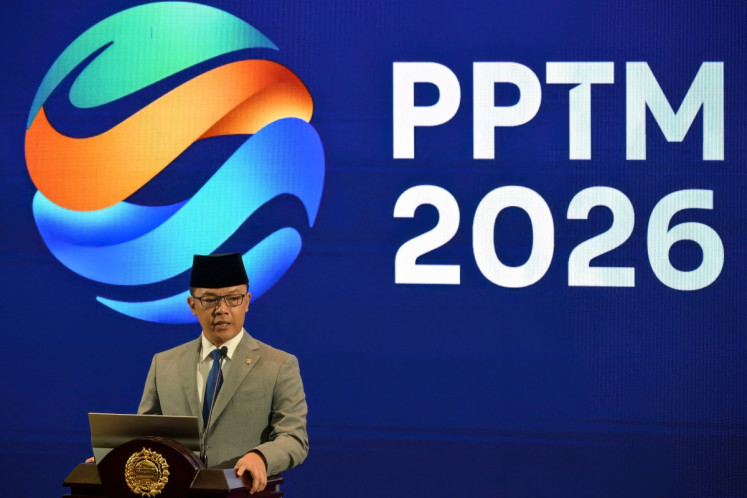Popular Reads
Top Results
Can't find what you're looking for?
View all search resultsPopular Reads
Top Results
Can't find what you're looking for?
View all search resultsFatherland: Soil and water
During the heyday of the revolution for the nation’s independence in the early 20th century, soil or land dominated the subject of intellectual debates
Change text size
Gift Premium Articles
to Anyone
D
uring the heyday of the revolution for the nation’s independence in the early 20th century, soil or land dominated the subject of intellectual debates. Water, which surrounded the islands in the archipelago, earned fewer spotlights.
True, the Indonesian anthem composed by respected Ahmadiyah follower, Wage Rudolf Supratman, contains the combination of two words “tanah air/soil and water”.
However, not only the anthem puts soil in the first place, it also emphasizes the role of land rather than water, such as in the phrase “tanah tumpah darahku/the soil in which my blood is shed.” In short, water, which covers most of the nation’s territory, has long received less attention.
Likewise, in pumping the spirit of the freedom fighters in the guerrilla wars against the two times Dutch aggressions, our national leaders, such as Gen. Soedirman and Soetomo, also pointed out land, or soil, symbolizing the fatherland, such as in the sentence “sejengkal tanah tak rela kuberikan pada penjajah / a mere inch of soil I will never let the colonial aggressor take.”
From elementary school, history teachers told us that the syncretic Hindu-Budhist Majapahit kingdom in East Java with its mighty army under the leadership of prime minister Gajah Mada conquered many other kingdoms in islands far away from Java. It is not hard to imagine that without an adept naval force it would have been impossible for Majapahit to fulfill the phenomenal palapa oath, by which was the vision to unite the hundreds of islands in the archipelago. However, most of us miss the ocean adventure of Gajah Mada’s legendary conquest.
Popular culture up to the 1990s, and perhaps until now, still mirrors the way in which history teachers instruct the subject. It is worth recalling that around the 1980s and the 1990s — unlike the later 2000s which were dominated by TV culture — radio drama became the people’s entertainment in spending their leisure time.
Most of the people were entertained by adventurous knights (pendekar) in the old kingdoms. Many dramas depicted Gajah Mada as a mighty warrior with an uncontestable mastery in fighting on land.
To illustrate the point, in the 1990s the popular radio drama, Tutur Tinular (oral tradition) by S. Tijab — which was later presented on the wide screen and in a TV series — described the mighty Gajah Mada with his skillful martial arts and invulnerability in the face of any weapons, ranging from swords, archers, lances, to daggers.
The current popular four volume novels about Gajah Mada by Langit Krisna Hariyadi also described the Majapahit’s prime minister with same the story and emphasis.
Nevertheless, during the New Order period, Soeharto imposed upon all students the responsibility of learning the dogmatic Wawasan Nusantara (the archipelagic insights) which touched upon the important role of the ocean in overseeing the archipelago. According to the wawasan, the sea does not disconnect seven hundred islands from each other, but serves as the “connector” uniting them. The sea is an integral part of the nation’s territory. Indonesians should not fear waves and tides in the ocean. Nor should they avoid them. This is in theory.
In practice, history testifies a different account. As an army general of land forces, Soeharto gave his legion various privileges, compared to the few personnel of the naval force in the government.
Various army generals held important ministerial and strategic positions. Only a few marshals had equal opportunity. The Javanese agricultural tradition also played a role in the political landscape and national culture. Compare this with the fishermen’s traditions which have had little impact upon us.
From Soeharto’s period onwards, the mighty maritime Buddhist kingdom of Sriwijaya has even now still received insufficient attention. In fact, through its naval force, this kingdom’s religious network and diplomatic relations went far beyond Southeast Asia.
Nevertheless, the northern part of the capital city of Jakarta is surrounded by sea. However, beaches and sea shores never become potential scenery adding beauty the city. Dirty rivers filled with garbage and human waste exacerbates the city’s ugly face. Rotten stench and hot temperatures have become the distinctive character of north Jakarta.
Indeed, both local and central governments have never successfully treated and managed or our waters. In fact, the capital city’s population is always haunted by wrathful water during the wet season.
Floods have always dominated newspapers’ and TV’s headlines during the rainy season.
During the current Jakarta gubernatorial campaigns, we heard only little, if ever, Jokowi-Ahok (Joko Widodo and Basuki Tjahaja Purnama) or Foke-Nara (Fauzi Bowo and Nachrowi Ramli) talking about water in the sea and rivers.
Nor are we told about the way in which these candidates will handle ports, beaches, and fishing. Worse, sensitive issues around religion and ethnicity have made politics dirtier — a crescendo song sung by legendary dangdut singer Rhoma Irama.
Water in the ocean, rivers, lakes and ponds remain obstacles for Indonesians to defend the national unity. We need to learn more about and love our sea, which is indeed far larger than our soil.
The writer, a lecturer at the Sunan Kalijaga State Islamic University, is a visiting research fellow at the Asia Research Institute, National University of Singapore










